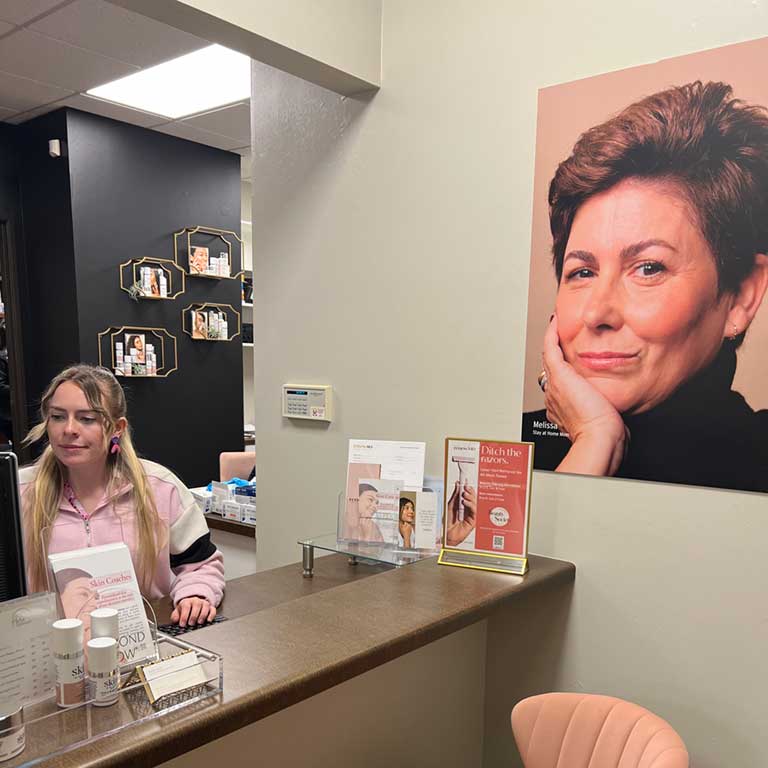Uncovering the Cure for Your Scalp Concerns
A dry, flakey, or otherwise irritated scalp can be caused by a number of factors. However, proper scalp skin care can alleviate even the most troublesome symptoms.
On The Skin Report podcast, Dr. Simran Sethi, an Internal Medicine doctor and Founder of RenewMD medical spas and SKIN by Dr. Sethi, addresses scalp skincare. She shares her insights on treatments that can relieve an irritated scalp, leading to healthier skin and hair. Read on to learn more about the causes of irritation and how you can care for your scalp.
Why Scalp Skincare is Essential
People don’t always consider their scalp maintenance as a part of their skincare. However, providing the proper care and nourishment to the skin on your scalp is essential to support your hair’s health and appearance.
Unfortunately, many people don’t realize their scalps require some TLC until they develop symptoms like itchiness, excess dryness, or dandruff. A scalp that is left unhealthy for an extended period of time can lead to worsening symptoms and even hair loss, as healthy skin is vital for providing nutrition to hair follicles necessary for hair growth.
Scalp Skincare Habits To Avoid
Of course, all skincare relies on the optimal balance between skin cleansing and retaining moisture. This rule is also applicable to maintaining scalp health.
Using Harsh Cleansers
People should avoid washing with harsh cleansers, as this can strip the skin of its essential oils, leading to a dry scalp. In addition, cleansers containing harsh chemicals can result in an overly dry scalp with more dead skin cells that traps dirt and debris, clogging follicles and creating cysts on the scalp.
Cleansing the Scalp Too Frequently
Cleansing the scalp too often can cause more hair loss, as scalps require moisture and blood flow to maintain healthy skin. This means that shampooing is not necessary more often than once a day. Dr. Sethi even recommends limiting shampooing to every other day to maintain your scalp’s natural moisture.
Double Cleansing or Double Washing Your Hair
Double washing is a trend where people apply shampoo, rinse, and repeat this process multiple times in one hair washing session. Double washing can put you at risk of overdrying your scalp and promoting excess sebum secretion in response to moisture loss.
Scalp Skincare Habits to Practice
The correct skincare methods to treat your scalp may depend on your skin condition. As Dr. Sethi explains in season 2, episode 11 of The Skin Report, conditions like dandruff and dry scalp may require further care.
However, the following skincare methods can be applied to maintain overall scalp health and may alleviate build-up and hair loss.
Use a Shower Filter
Build-up can be caused by many factors, including shower water. Showering with hard water can cause a build-up of minerals on your hair and scalp, compared to soft water. Investing in a water filter can help avoid excess build-up from hard water minerals and may also reduce skin irritation.
Massage the Scalp
Massaging the scalp can boost the health of your scalp and hair, as it increases blood flow to the area, delivering more nutrients to hair follicles. Scalp massages can also remove debris from the scalp, improving the skin’s overall health.
Use UV Protection
The hair on our scalps can protect our skin from UV radiation. However, age and hormone changes can lead to hair loss. So, to protect the scalp from UV exposure, people who are bald or have thinning hair can apply sunscreen to their scalp or wear hats to cover their exposed skin.
Maintain Nutritional Health
The skin on your scalp can indicate the health of the rest of your body. Therefore, eating well and maintaining proper nutrients is essential for scalp health. Practicing extremely calorie-restrictive diets that don’t allow for the right amount of nutrients can leave your scalp unable to support hair growth.
To learn more about proper scalp care and Dr. Sethi’s recommendations for treating conditions like dandruff, check out Season 2, Episode 11 of The Skin Report podcast!








Leave A Comment